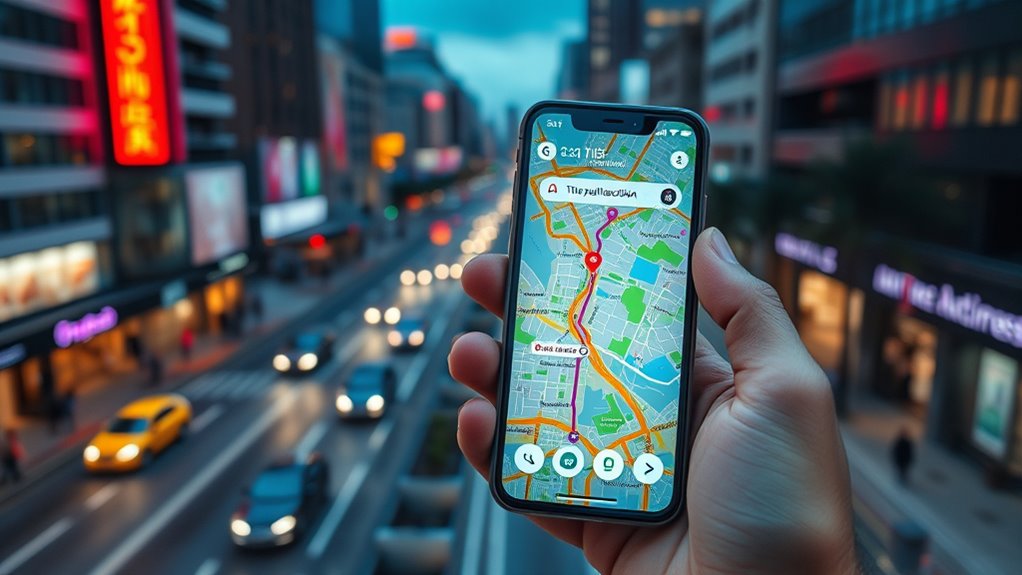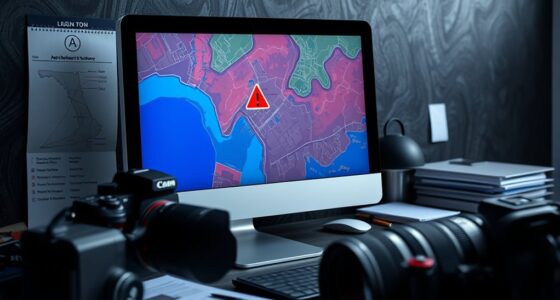Smart mapping apps collect your location data, including GPS coordinates, for real-time tracking and navigation. They also gather device information like your device type and operating system, along with movement patterns such as speeds and visited places. This data helps improve traffic predictions and app performance. Additionally, your data may be shared with third parties for advertising or service enhancements. Keep exploring to discover ways to protect your privacy and control what you share.
Key Takeaways
- They collect GPS location data, including real-time coordinates and movement patterns.
- Device information such as type, operating system, and unique identifiers is gathered.
- Data on visited locations, speed, and routes is used to improve navigation accuracy.
- Location data may be shared with third-party partners, advertisers, or government agencies.
- Users’ location histories are stored, raising privacy concerns about long-term data retention.

Have you ever wondered how modern mapping apps deliver such accurate and real-time information? These apps are incredibly sophisticated, relying on vast amounts of data to give you directions, traffic updates, and location insights instantly. But this convenience comes with questions about privacy concerns and data sharing. When you use a smart mapping app, you’re not just passively receiving information—you’re actively sharing your location and other personal details, often without realizing the extent of it.
Mapping apps collect a variety of data points to function effectively. Your GPS coordinates are the most obvious, providing the core information needed to pinpoint your location and guide you along your route. But they also gather data about your device, such as device type, operating system, and unique identifiers, to ensure the app works smoothly across different platforms. Additionally, these apps often track your movement patterns—how fast you’re going, where you’ve been, and how often you visit certain places. This data helps improve routing algorithms and traffic predictions but raises privacy concerns for many users. Understanding the types of data collected can help you make informed decisions about your privacy.
Mapping apps track device info and movement patterns to improve navigation and traffic predictions.
Data sharing is another critical aspect. Your location data might be shared with third-party partners, advertisers, or even government agencies, depending on the app’s privacy policies. Companies often justify this by claiming it helps improve their services or provide targeted advertising, but it can also lead to your personal information being used in ways you didn’t anticipate. Sometimes, this data sharing is done with your explicit consent, but other times, it happens silently in the background, leaving you unaware of the full scope of data being exchanged.
Privacy concerns escalate when you think about how long your data might be stored and who has access to it. Many mapping apps retain location histories, allowing for detailed profiles of your habits and routines. If this information falls into the wrong hands or is misused, it can compromise your safety and privacy. Furthermore, some apps may share your data across borders, raising questions about jurisdiction and data protection laws.
To protect yourself, it’s essential to review the privacy settings on your mapping apps and understand what data they collect and share. Opting out of unnecessary data sharing or disabling location history can help mitigate privacy risks. Being aware of how your data is used and shared is key to maintaining control over your personal information while still enjoying the benefits of smart mapping technology. Ultimately, while these apps make navigation easier, balancing convenience with privacy awareness is something you should always keep in mind.
Frequently Asked Questions
How Is My Location Data Protected in These Apps?
You might wonder how your location data is safeguarded in these apps. Usually, privacy policies explain how your data is handled, and reputable apps require your user consent before collecting any information. Make sure to read the privacy policies carefully and adjust your settings to control what data you share. By doing so, you help ensure your location data remains protected and your privacy is respected.
Do These Apps Share Data With Third Parties?
You might wonder if these apps share your data with third parties. Many have privacy policies that specify how they handle your information. Some apps engage in third-party partnerships, which means they could share your location and usage data with advertisers or analytics providers. Always review the privacy policies to understand what data is shared and how it’s protected, so you can make informed decisions about your privacy.
Can I Opt Out of Data Collection?
A wise man once said, “You are what you share.” You can usually opt out of data collection to protect your location privacy. Check the app’s privacy settings or privacy policy for options to disable location tracking or data sharing. While some apps make opting out straightforward, others may limit your features unless you consent. Always stay informed and take control of your data opt out choices to safeguard your privacy.
What Types of Personal Information Are Stored?
You might worry about what personal information is stored, which raises privacy concerns. Typically, these apps collect data like your location, device info, and usage patterns. This info is often protected through data encryption, but you should still be cautious. Be aware that your personal data could potentially be accessed or misused, so it’s wise to review privacy policies and adjust settings to limit data sharing whenever possible.
How Long Is My Data Retained by These Apps?
Did you know that 60% of apps retain user data for over a year? Your data retention depends on each app’s policies; some keep it longer, while others delete it quickly. You should always review data retention policies and adjust your privacy settings accordingly. This way, you control how long your information stays stored, helping protect your privacy and giving you peace of mind.
Conclusion
So, stay savvy and scrutinize what your smart mapping apps store and share. By being brave, you bolster your privacy and prevent potential pitfalls. Remember, data diligence defends your digital domain, driving your decisions and dictating your digital destiny. Stay sharp, stay secure, and don’t surrender your privacy to silken-sounding software without scrutinizing its substance. Your data, your domain—shield it wisely, and navigate the network with knowledge and confidence.









